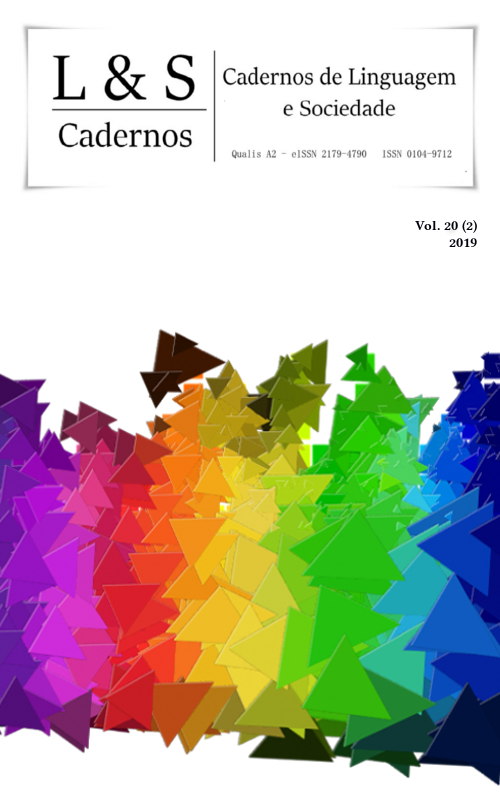The figurative functions of the metadiscourse commentary in electoral debates
DOI:
https://doi.org/10.26512/les.v20i2.24445Keywords:
Metadiscourse commentary, Electoral debates, Face workAbstract
This work, which adopts an interactionist perspective of discourse studies, investigates the functions of the metadiscourse commentary (CM) in the face work done by the politicians protagonists of two electoral debates. Based on previous research on the CM, we characterize the CMs of the corpus in terms of their potential for attack and defense of the faces constructed together in the debates. As evidenced by the results, by using this discourse relation, each candidate is able to play a tense line of behavior, with which he constantly measures the intensity of attacks and defenses against faces.
Downloads
References
AQUINO, Z. G. O. 2008. Diálogos da mídia: o debate televisivo. In: PRETI, D. (org.) Diálogos na fala e na escrita. São Paulo: Humanitas, 2008. p. 171-194.
BLAS-ARROYO, J. L. “Perdóneme que se lo diga, pero vulve usted a faltar a la verdade, señor Gonzáles”: form and function of politic verbal behavior in face-to-face Spanish political debates. Discourse & Society, Nova York, v. 14, n. 4, p. 395-423, 2003.
BROWN, P.; LEVINSON, S. C. Politeness: some universals in language use. Cambridge, Cambridge University Press, 1987.
CULPEPER, J. Towards an anatomy of impoliteness. Journal of Pragmatics, Amsterdã, v. 25, n. 3, p. 349-367, 1996.
CULPEPER, J. Impoliteness and entertainment in the television quiz show: The Weakest Link. Journal of Politeness Research, Berlim, n. 1, p. 35-72, 2005.
CULPEPER, J. Impoliteness: using language to cause offense. Cambridge: Cambridge University Press, 2011.
CULPEPER, J.; TERKOURAFI, M. Pragmatic approaches (im)politeness. In: CULPEPER, J.; HAUGH, M.; KÁDÁR, D. Z. (orgs.), The Palgrave Handbook of Linguistic (Im)politeness. London: Palgrave, 2017. p. 11-38.
CUNHA, G. X. As condições de emergência da função reformulativa do conector quando em reportagens. Revista de Estudos da Linguagem, Belo Horizonte, v. 22, n. 1, p. 143-170, 2014.
CUNHA, G. X. As relações retóricas e a negociação de faces em debate eleitoral. Confluência, Rio de Janeiro, v. 1, p. 205-238, 2015.
CUNHA, G. X. O papel dos conectores na co-construção de imagens identitárias: o uso do mas em debates eleitorais. ALFA, São José do Rio Preto, v. 61, n. 3, p. 599-623, 2017a.
CUNHA, G. X. Conectores e processo de negociação: uma proposta discursiva para o estudo dos conectores. Fórum Linguístico, Santa Catarina, v. 14, p. 1699-1716, 2017b.
CUNHA, G. X. Estratégias de impolidez como propriedades definidoras de interações polêmicas. Delta: Documentação e Estudos em Linguística Teórica e Aplicada, São Paulo, v. 35, n. 2, p. 1-28, 2019.
CUNHA, G. X.; BRAGA, P. B. O comentário metadiscursivo como estratégia argumentativa em debates eleitorais. EID&A, Ilhéus, v. 12, p. 101-118, 2016.
CUNHA, G. X.; BRAGA, P. B. Definindo o comentário metadiscursivo em uma perspectiva interacionista da Análise do Discurso. SCRIPTA, Belo Horizonte, v. 22, p. 171-188, 2018.
CUNHA, G. X.; MARINHO, J. H. C. A expressão conectiva na verdade: contribuições para uma abordagem polifônica dos conectores reformulativos. Signo, Santa Cruz do Sul, v. 42, p. 53-64, 2017.
DOURY, M.; KERBRAT-ORECCHIONI, C. La place de l’accord dans l’argumentation polémique: les cas du débat Sarkozy/Royal (2007). A contrario, Paris, v. 16, n. 2, p. 63-87, 2011.
DUCROT, O. O dizer e o dito. Campinas: Pontes, 1987.
FRACCHIOLLA, B. 2011. Politeness as strategy of attack in a gendered political debate ”“ the Royal-Sarkosy debate. Journal of Pragmatics, Amsterdã, v. 43, p. 2480-2488, 2011.
GOFFMAN, E. On face-work: an analysis of ritual elements in social interaction. In: GOFFMAN, E. Interaction Ritual: essays on face-to-face behavior. New York: Pantheon Books, 1967[1955]. p. 5-45.
GOFFMAN, E. La mise em scène de la vie quotidienne: les relations em public. Paris : Les Éditions de Minuit, 1973.
KERBRAT-ORECCHIONI, C. Les interactions verbales. Paris: Colin, 1992.
KERBRAT-ORECCHIONI, C. Introduction. In: KERBRAT-ORECCHIONI, C.; PLANTIN, C. (orgs.). Le trilogue. Lyon : Presses Universitaires de Lyon, 1995. p. 1-28.
KERBRAT-ORECCHIONI, C. Le désaccord, réaction “non préférée”? Les cas des débats présidentiels. Cahiers de praxématique, Montpellier, n. 67, 2016, p. 1-20.
KERBRAT-ORECCHIONI, Catherine. Les débats de l’entre-deux-tours des élections présidentielles françaises: constantes et évolutions d’un genre. Paris : L’Harmattan, 2017.
LEECH, G. Principles of Pragmatics. London: Longman, 1983.
LEECH, G. The pragmatics of politeness. Oxford: Oxford University Press, 2014.
PERRIN, L. Polyphonie et autres formes d’hétérogénéité énonciative : Bakhtine, Bally, Ducrot, etc. Pratiques, Paris, n. 123/124, 2004, p. 7-26.
ROULET, E. Stratégies d’interaction, modes d’implicitation et marqueurs illocutoires. Cahiers de Linguistique Française, Genebra, v. 1, p. 80-103, 1980.
ROULET, E. De la nécessité de distinguer des relations de discours sémantiques, textuelles et praxéologiques. In: ANDERSEN, H. L.; NØLKE, H (org.). Macro- syntaxe et macro-sémantique. Bern: Peter Lang, 2002, p. 35-57.
ROULET, E. The description of text relation markers in the Geneva model of discourse organization. In: FISCHER, K. (org.). Approaches to Discourse Particles. Amsterdam: Elsevier, 2006, p. 115-131.
ROULET, E.; FILLIETTAZ, L.; GROBET, A. Un modèle et un instrument d'analyse de l'organisation du discours. Berne: Peter Lang, 2001.



